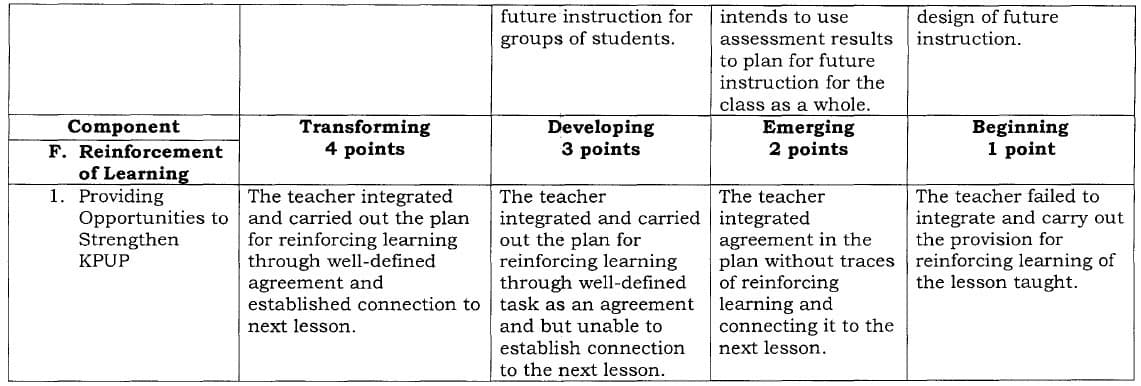June 29, 2016
DepEd Order No. 50, s. 2016
Table of Contents
HIRING GUIDELINES FOR TEACHER I POSITIONS IN SCHOOLS IMPLEMENTING INDIGENOUS PEOPLES EDUCATION EFFECTIVE SCHOOL YEAR 2016-2017
To:
Undersecretaries
Assistant Secretaries
Bureau and Service Directors
Regional Directors
Schools Division Superintendents
Public Elementary and Secondary Schools Heads
All Others Concerned
1. In line with DepEd Order No. 62, s. 2011 entitled National Indigenous Peoples Education Policy Framework, and Republic Act No. 10533 entitled Enhanced Basic Education Act of 2013, the Department of Education (DepEd) issues the enclosed Hiring Guidelines for Teacher I Positions in Schools Implementing Indigenous Peoples Education (IPEd) Effective School Year (SY) 2016-2017.
2. These Guidelines shall be used specifically in the hiring of teachers for Kindergarten, Elementary, and Junior High Schools implementing IPEd, as identified by the schools division offices, consistent with the policy thrust to ensure that teacher hiring and deployment are responsive to the requirements of the envisioned quality of culture-based education under the K to 12 Basic Education Program.
3. Immediate dissemination of and strict compliance with this Order is directed.
BR. ARMIN A. LUISTRO FSC
Secretary
Read:
- DM 105, s. 2016 – Senior High School (SHS) Training of Teachers for the k to 12 Basic Education Program
- DM 108, s. 2016 – Preparedness Measures for the Rainy Season
- DM 100, s. 2016 – 2016 Nutrition Month Celebration
- DO 49, s. 2016 – Guidelines on the Hiring of Contractual (Full-time and Part-time) Teachers in Senior High School
(Enclosure to DepEd Order No. 50, s. 2016)
HIRING GUIDELINES FOR TEACHER I POSITIONS IN SCHOOLS IMPLEMENTING INDIGENOUS PEOPLES EDUCATION (IPEd) EFFECTIVE SCHOOL YEAR (SY) 2016-2017
1.0 BACKGROUND AND RATIONALE
As mandated by the Enhanced Basic Education Act of 2013 (Republic Act [RA] No. 10533), the K to 12 Basic Education Program seeks to “make education learner-centered and responsive to the needs, cognitive and cultural capacity, the circumstances and diversity of learners, schools and communities” (Section 2.c). It further stipulates that the basic education curriculum should be culture-sensitive, contextualized, and flexible enough to enable and allow schools to localize, indigenize and enhance based on their respective educational and social contexts (Section 5). These curriculum standards and principles guide the Department of Education (DepEd) in maintaining a basic education system that is inclusive, equitable, and culture-based.
Consistent with the National Indigenous Peoples Education (IPEd) Policy Framework (DepEd Order [DO] No. 62, s. 2011) and RA 10533, DepEd has institutionalized the IPEd Program as a response to the right of indigenous peoples (IP) communities to basic education that is responsive to their context, respects their identities, and promotes the value of their indigenous knowledge, competencies, and other aspects of their cultural heritage. DepEd recognizes the central importance of Indigenous Knowledge Systems and Practices (IKSPs) and Indigenous Learning Systems (ILS) and seeks the integration of IKSPs in all learning areas. To operationalize this in schools and other education programs, DepEd has also adopted the IPEd Curriculum Framework (DO 32, s. 2015), which provides guidance in contextualizing the K to 12 Curriculum specific to the realities and needs of IP communities.
Recognizing the critical role of teachers in the successful implementation of DepEd’s education programs, the National IPEd Policy Framework (DO 62, s. 2011) underscores the need to strengthen the hiring, deployment and continuous development of teachers to support the objectives of the IPEd Program (Section 15.d). The IPEd Curriculum Framework (DO 32, s. 2015) further highlights the need to respond to specific issues in the deployment of teachers and school heads to support effective curriculum implementation.
In line with the abovementioned policy thrusts and ensuring that teacher hiring and deployment, specifically in schools implementing IPEd, are responsive to the requirements of the IPEd Program and the envisioned quality of culture-based education under the K to 12 Basic Education Program, these hiring guidelines are hereby promulgated.
2.0 COVERAGE
These guidelines shall be used specifically in the hiring of teachers for Kindergarten, Elementary, and Junior High Schools (JHS) implementing IPEd, as identified by the Schools Division Office (SDO), particularly in relation to the following educational concerns:
2.1 Teaching using the Mother Tongue of an IP community from Kindergarten to Grade 3
2.2 Contextualization of the curriculum for IPEd in any level from Kindergarten to Grade 10
2.3 Designing and delivering culturally appropriate teaching-learning sessions as guided by a contextualized curriculum for IP learners in any level from Kindergarten to Grade 10
3.0 DEFINITION OF TERMS
3.1 Applicant refers to a person who holds a valid certificate of registration/professional license as a teacher from the Professional Regulation Commission (PRC) seeking to be appointed to a Teacher I Position.
3.2 Bona fide resident refers to an applicant who has been residing for at least six (6) months at the barangay, municipality, city or province in which the school being applied to for a teaching position is located, as evidenced by the Personal Data Sheet (CSC Form 212, Revised 2005), a Voter’s Identification Card, or any proof of residency deemed acceptable by the School Screening Committee.
3.2.1 An applicant who has taught as an LGU-funded teacher, Kindergarten Volunteer Teacher (KVT) or substitute teacher for at least one (1) school year in the barangay, municipality, city or province where the school being applied to for a teaching position is located shall also be considered as a bona fide resident, to be validated by a certificate of employment.
3.3 Indigenous Peoples /Indigenous Cultural Community (IP/ICC) refers to a group of people or homogenous societies identified by self-ascription and ascription by others, who have continuously lived as organized community on communally bounded and defined territory, and who have under claims of ownership since time immemorial, occupied, possessed and utilized such territories, sharing common bonds of language, customs, traditions and other distinctive cultural traits, or who have, through resistance to political, social and cultural inroads of colonization, non-indigenous religions and cultures, became historically differentiated from the majority of the Filipinos. IP/ICC shall likewise include peoples who are regarded as indigenous on account of their descent from the populations, which inhabited the country, at the time of conquest or colonization, or at the time of inroads of non-indigenous religions and cultures, or the establishment of present state boundaries, who retain some or all of their own social, economic, cultural and political institutions, but who may have been displaced from their traditional domains or who may have resettled outside their ancestral domains (Section 3.h, RA 8371 or the Indigenous Peoples Rights Act (IPRA) of 1997).
3.4 Indigenous Peoples Education (IPEd) Program refers to the program that supports education initiatives undertaken under formal, non-formal, and informal modalities with emphasis on any of, but not limited to, the key areas of: Indigenous Knowledge Systems and Practices and community history; indigenous languages; Indigenous Learning Systems (ILS) and community-life cycle-based curriculum and assessment; educational goals, aspirations, and competencies specific to the Indigenous Cultural Community (ICC); engagement of elders and other community members in the teaching-learning process, assessment, and management of the initiative, recognition and continuing practice of the community’s ILS; and the rights and responsibilities of ICCs (Section 8.4, Implementing Rules and Regulations (IRR) of RA 10533).
3.5 Locality refers to the barangay, municipality, city or province where the school being applied for is located.
3.6 Mother Tongue refers to the Mother Language or First Language (LI) as defined in the Implementing Rules and Regulations of RA 10533. It refers to the “language or languages first learned by a child, which he or she identifies with, is identified as a native language user of by others, which he or she knows best, or uses habitually” (Section 4.d, IRR of RA 10533).
3.7 Qualified applicant refers to an applicant who has been screened and who, therefore, meets the evaluation and selection criteria used by the Schools Division as provided for in the enclosed guidelines.
3.8 Registry of Qualified Applicants (RQA) refers to the official list of applicants who obtained an overall score of seventy (70) points and above based on the criteria set and as a result of the evaluation and selection process.
4.0 BASIC RULES ON HIRING AND DEPLOYMENT OF TEACHER POSITIONS
4.1 Public school teachers requesting for transfer to another station are not considered new applicants and are therefore not subject to these hiring guidelines. DepEd Order No. 22, s. 2013, otherwise known as the “Revised Guidelines on the Transfer of Teachers from One Station to Another,” shall be strictly observed.
4.2 Upon a teacher’s appointment, assignment to a station, and acceptance of the position, he or she shall not be transferred to another school until after rendering at least three (3) years of service in that school.
4.3 Residents of the locality, LGU-funded teachers, substitute teachers, volunteer teachers, and Philippine Business for Education (PBEd) graduates under the 1000 Teachers Program (1000 TP) shall be subject to these hiring guidelines.
4.4 As provided in Section 26 (b) Paragraph 2 of RA 9293 entitled “An Act Amending Certain Sections of Republic Act Numbered Seventy-eight Hundred and Thirty-six (RA 7836), Otherwise Known as the Philippine Teachers Professionalization Act of 1994,” teachers who have not practiced their profession for the past five (5) years shall be required to take at least twelve (12) units in education courses, consisting of at least six (6) units of content courses.
5.0 APPLICATION PROCESS AND REQUIREMENTS
5.1 Applicants who already applied for the initial round of hiring per DepEd Order No. 7, s. 2015 (and DepEd Order No. 22, s. 2015, if necessary) shall no longer resubmit their documentary requirements but may submit additional supporting documents to update their points. A new application letter shall also be submitted specifying the school they are applying to.
5.2 New applicants shall register to the Department’s online system at application.deped.gov.ph. where they must encode their Personal Data Sheet (PDS) and select the division(s) where they want to be ranked. Once submitted, a Unique Applicant Number (UAN) will be issued.
5.2.1 Each division shall assign an e-mail address (either its official division office’s e-mail or its HR’s e-mail) where the system will forward the applications.
5.2.2 Applicants who are not able to submit the UAN shall still be allowed to apply. The UAN shall not be treated as an eligibility requirement. Even without the UAN, applicants may still go through the evaluation process, be ranked in the Registry of Qualified Applicants (RQA), and be hired.
5.3 New applicants shall submit to the SDO or the school head of the elementary or secondary school where a teacher shortage or vacancy (regular and/or natural) exists, a written application (preferably with the UAN indicated), supported by the following documents:
a. CSC Form 212 (Revised 2005) in two copies with the latest 2×2 ID picture
b. Certified photocopy of Professional Regulation Commission (PRC) professional identification card or a PRC certification showing the teacher’s name, Licensure Examination for Teachers (LET) rating, and other information recorded in the PRC Office
c. Certified photocopy of ratings obtained in the LET/Professional Board Examination for Teachers (PBET)
d. Certified copy of transcript of records
e. Copies of service records, performance rating, and school clearance for those with teaching experience. If unavailable, the applicant must submit a justification citing the reason/s for unavailability.
f. Certificates of specialized training, if any
g. Certified copy of the Voter’s ID and/or any proof of residency deemed acceptable by the School Screening Committee
h. NBI Clearance
i. For applicants who by ethnicity belong to an ICC/IP community, a certificate or any form of attestation from the IP elder(s)/leader(s) recognized by the community attesting that the applicant is a member of the IP community.
j. Omnibus certification of authenticity and veracity of all documents submitted, signed by the applicant
5.4 The applicant assumes full responsibility and accountability on the validity and authenticity of the documents submitted, as evidenced by the Omnibus certification of authenticity (Item 5.3.j above). Any violation shall automatically disqualify the applicant from the selection process.
6.0 EVALUATION AND SELECTION COMMITTEES
6.1 The Schools Division Superintendent (SDS) shall issue a Memorandum organizing and designating the members of the following committees:
6.1.1 School Screening Committee
6.1.2 Division Selection Committee
6.2 The Committees shall have the following compositions and functions:
6.2.1 School Screening Committee
6.2.1.1 Composition
a. The Committee at the elementary level shall be chaired by the School Head with four (4) teachers as members. In the case of primary, incomplete elementary and multi-grade (MG) schools, the Committee shall be chaired by the cluster school head with four (4) teachers from the cluster schools as members.
b. The Committee at the secondary level shall be chaired by the School Head. The Department Head concerned and three (3) teachers from the different learning areas (as needed based on the school’s vacancies) shall be members. For small secondary schools that do not have department heads, the School Head shall be the Committee Chair with four (4) subject leaders from different learning areas as members.
c. Committee members shall be identified by the School Head using the abovementioned specifications. The School Head shall then transmit the Composition of the School Screening Committee to the Schools Division Superintendent for the issuance of a corresponding Designation Order.
6.2.1.2 Functions
a. Ensures that the updated lists of vacancies are regularly posted at conspicuous places and at the websites of schools and teacher education training institutions at all times. The step-by-step procedure in applying for the Teacher I positions, including a copy of this Order, must also be posted.
b. Receives applications and documents.
c. Verifies and certifies as to completeness, veracity, accuracy, and authenticity of documents.
d. Issues a certification to each applicant that it has received the application specifying the documents that have been submitted in support of the application.
i. The School Screening Committee shall not refuse acceptance of any application. If any of the required documents are incomplete or invalid, the Committee shall immediately notify the applicant to facilitate the complete and proper submission of documents.
ii. Regardless of being incomplete or invalid, however, all applications must still be forwarded to the Division Selection Committee, albeit such submissions must be noted and marked by the Committee.
e. Produces copies of the received applications and documents before submitting the original submissions to the Division Selection Committee. The copies are then to be compiled and/or bound, with a table of contents and proper pagination, and are to be kept in the Office of the School Head for records purposes.
6.2.2 Division Selection Committee
6.2.2.1 Composition
For Elementary Schools
Chair. Assistant Schools Division Superintendent (ASDS)
Members:
Division IPEd Focal Person
Three (3) Education Program Supervisors/Specialists
Division Chapter President of the Philippine Elementary Schools Principals Association (PESPA)
Division Level President of the Parent-Teacher Association (PTA)
Authorized representative of an accredited teachers’ union, as evidenced by the Certificate of Accreditation issued by the Civil Service Commission (CSC)
In the evaluation of SPED elementary applicants, the SPED Division Coordinator shall be part of the Committee.
For MG schools, the Division MG Coordinator shall be part of the Committee.
The recognized IP customary elders/leaders where the school is located shall be consulted by the Committee to verify and better assess applications.
For Secondary Schools (Grades 7 to 10)
Chair. Assistant Schools Division Superintendent Members:
Division IPEd Focal Person
Three (3) Education Program Supervisors/Specialists
Division Chapter President of the National Association of Public Secondary School Heads, Inc. (NAPSSHI) or the National Association of Secondary Schools of the Philippines (NASSHPHIL)
Division Level President of the Parent-Teacher Association (PTA)
Authorized representative of an accredited teacher’s union, as evidenced by a Certificate of Accreditation issued by the Civil Service Commission
In the evaluation of SPED secondary applicants, the SPED Division Coordinator shall be part of the Committee.
The recognized IP customary elders/leaders where the school is located shall be consulted by the Committee to verify and better assess applications.
a. In schools divisions where there is no ASDS, the Superintendent shall designate an Education Program Supervisor as the Chair of the Division Selection Committee.
b. The official in charge of personnel actions shall provide secretariat services and maintain the minutes of proceedings of the selection and deliberation process. The minutes shall be signed by the Chair and all members of the Division Selection Committee.
6.2.2.2 Functions
a. Receives from the School Screening Committee the list of applicants with the corresponding documents.
b. Verifies the documents submitted by the School Screening Committee as to completeness, accuracy, authenticity, and veracity.
c. Evaluates applicants on Education, Teaching Experience, LET/PBET Rating, Interview, Demonstration Teaching, and Specialized Training and Skills based on the criteria set forth in these guidelines.
d. Reviews and consolidates the results of the individual ratings of applicants, based on the scores they obtained in each criterion for evaluation.
e. Prepares separate division-wide RQAs for Kindergarten, Elementary, and Secondary
f. Sends to each applicant a written communication detailing the scores he or she has received for each evaluation criterion as well as the final overall rating, signed by the Chair.
g. Secures list of its LGU-funded teachers from the office of the provincial governor, city/municipal mayor, or provincial/city/municipal administrator.
h. Ensures that LGU-funded and volunteer teacher applicants go through the application process as provided for in these guidelines.
i. Recalibrates and/or updates the scores of previous applicants who have undergone the evaluation process per DepEd Order No. 7, s. 2015 (and DepEd Order No. 22, s. 2015, if necessary) in accordance to the guidelines set in this Order.
j. Submits the complete results of the evaluation of applicants, including pertinent records of deliberations, to the SDS for approval.
6.3 In preparation for hiring, the SDO with the participation of the Division IPEd Focal Person, district supervisors, school heads, customary elders and leaders of IP communities shall analyze the education situation of IP learners guided by DepEd Order No. 62, s. 2011, DepEd Order No. 51, s. 2014, and DepEd Order No. 32, s. 2015 to determine and identify the needed teachers in schools serving IP learners. The IPEd Framework formulated by the SDO together with the IP communities (as articulated in Section VI. 1 of DO 32, s. 2015) is a key reference during the discussion. Language needs and the contextualization of the curriculum shall also be primary considerations in the discussion.
7.0 EVALUATION AND SELECTION PROCEDURE AND CRITERIA
Applicants shall be evaluated using the following criteria:
| CRITERIA | POINTS |
| a. Education | 15 |
| b. Teaching Experience | 10 |
| c. LET/PBET Rating | 15 |
| d. Specialized Training and Skills | 15 |
| e. Interview | 20 |
| f. Demonstration Teaching | 20 |
| g. English Communication Skills | 5 |
| TOTAL | 100 |
7.1 Education – 15 points
Education shall be rated in terms of the applicant’s academic achievement. Thus, all subjects with corresponding units must be included in the computation.
7.1.1 Rating of Education shall be based on the following equivalents, with 1.0 as the highest and 3.0 as the lowest:
| General Weighted Average (GWA) | Equivalent Points |
| 1.2 - 1.0 | 13.00 |
| 1.5 - 1.3 | 12.50 |
| 1.8 - 1.6 | 12.00 |
| 2.1 - 1.9 | 11.50 |
| 2.4 - 2.2 | 11.00 |
| 2.7 - 2.5 | 10.50 |
| 3.0 - 2.8 | 10.00 |
When the percentage rating is used, the following table of equivalents shall be used, with 1.0 as the highest and 3.0 as the lowest:
| Percentage Rating | GWA |
| 99.00 - 100 | 1.0 |
| 97.75 - 98.75 | 1.1 |
| 96.50 - 97.50 | 1.2 |
| 95.25 - 96.25 | 1.3 |
| 94.00 - 95.00 | 1.4 |
| 92.75 - 93.75 | 1.5 |
| 91.50 - 92.50 | 1.6 |
| 90.25 - 91.25 | 1.7 |
| 89.00 - 90.00 | 1.8 |
| 87.75 - 88.75 | 1.9 |
| 86.50 - 87.50 | 2.0 |
| 85.25 - 86.25 | 2.1 |
| 84.00 - 85.00 | 2.2 |
| 82.75 - 83.75 | 2.3 |
| 81.50 - 82.50 | 2.4 |
| 80.25 - 81.25 | 2.5 |
| 79.00 - 80.00 | 2.6 |
| 77.75 - 78.75 | 2.7 |
| 76.50 - 77.50 | 2.8 |
| 75.00 - 76.25 | 2.9 - 3.0 |
Applicants with non-education degrees shall be rated using their GWAs in their baccalaureate degrees and the eighteen (18) professional units in education.
If the school issues a certification of GWA with a corresponding percentage rating that does not conform to the above table, the committee shall refer to the grading system of the school.
For schools with “unique” grading systems, a corresponding transmutation table shall be constructed.
Applicants with a Master’s Degree (MA or MS) shall be given +1 point, while applicants with a Master’s Degree and with a Doctorate (PhD) shall be given +2 points.
Applicants shall be given +1 point for each of the following that they satisfy:
a. with a baccalaureate thesis related to IPEd
b. with a Master’s Degree thesis related to IPEd
c. with a doctoral dissertation related to IPEd
If the total points reached by an applicant exceed fifteen (15) points, a rating of 15 is given.
7.1.2 Additional requirements for kindergarten applicants
a. He/she must have obtained any of the following degrees, or its equivalent:
Degrees:
- Bachelor in Early Childhood Education
- Bachelor of Science in Preschool Education
- Bachelor of Science in Family Life and Child Development
- Bachelor in Elementary Education, with specialization in Kindergarten, Preschool or Early Childhood Education (ECE)
- Bachelor in Elementary Education, Major in Teaching Early Grades
- Bachelor of Arts/Science Degree in discipline allied to Education, such as Psychology, Nursing, Music and Arts, et cetera, with at least 18 units in content courses or subjects in ECE
Equivalent:
- Bachelor in Elementary Education, Major in Special Education (SPED) with 18 units in ECE
- Bachelor of Secondary Education with additional Diploma in ECE including Practice Teaching in Kindergarten Education
- Other degree courses and/with at least 18 units in Early Childhood Education
The Division Selection Committee may consider any other similar Bachelor’s degree in Early Education.
b. In cases where there are limited eligible teachers with ECE units, the following measures may be adopted.
- Upon appointment, the teacher shall be “equired by the SDO to earn ECE units gradually. Nine (9) ECE units may be earned at the end of Year 1; eighteen (18) units, Year 2; and twenty-one (21) units, Year 3.
c. Kindergarten teacher applicants must not be more than forty-five (45) years old.
7.1.3 Additional requirements for SPED elementary applicants
a. He/she must possess any of the following qualifications:
| Educational Qualification | Requirement |
| BSEEd-BS Special Education | With Specialization in SPED-Undergrad |
| BSEEd/BSSPEd | With 18 Units MA-SPED and 3 years actual teaching in SPED VS Performance Rating |
| BSEEd/BSSPEd | With 15 units MA-SPED and 4 years of actual teaching in SPED VS Performance Rating |
| BSEEd/BSSPEd | With 12 Units in MA-SPED and 5 years of actual teaching in SPED VS Performace Rating |
| BSEEd/BSE | With 9 units MA-SPED and 6 years actual teaching in SPED VS Performance Rating |
| BSEEd/BSSPEd/BSE | With teaching experience in SPED or Inclusive Setting VS Performance Rating |
In cases where applicants do not have the appropriate educational qualifications for SPED, they may still be evaluated but shall be categorized separately from those who have met the said requirements.
b. He/she must have at least three (3) years of experience in providing educational services to any of the categories of children with special needs. This is to be verified by a certification from the Principal to be submitted as part of the application.
c. A certification from the Principal that the applicant has had a Very Satisfactory performance rating for the last three (3) years must be submitted as part of the application.
7.1.4 Additional requirements for SPED secondary applicants
He/she must possess any of the following qualifications:
- Bachelor of Secondary Education, major in Special Education
- Bachelor of Secondary Education plus 18 units in special education in the graduate level
- Bachelor of Secondary Education plus 15 units in special education with 2 years of very satisfactory teaching experience in the regular schools and is willing to be trained within a year
- Bachelor of Secondary Education plus 12 units in special education with 4 years of very satisfactory teaching experience in the regular schools and is willing to be trained within a year
- Bachelor of Secondary Education plus 9 units in special education with 6 years of very satisfactory teaching experience in the regular schools and is willing to train within a year
- Bachelor of Secondary Education plus 2 years of very satisfactory teaching experience as a SPED teacher
7.2 Teaching Experience – 10 points
Teaching experience in Early Childhood (EC) kindergarten/preschool, elementary, secondary, tertiary, higher education, Special Education (SPED), Alternative Learning System (ALS), Technical-Vocational Education and Training (TVET), learning institutions offering culture-based education programs for IP learners – even prior to passing the LET – shall be given 0.50 point for every month of service.
Example: 8 months = 4 points / 10 months = 5 points
The full 0.50 point per month of teaching experience shall be given to applicants who have come from schools and learning institutions that serve IP learners and are either of the following:
- government-accredited or recognized school
- not recognized but is known to the SDO to be operating a community-based education program for IP learners that is in good standing with the community
- service provider for ALS
Certificate/s of employment shall be used to determine validity of teaching experience.
Teaching experience of kindergarten volunteer teachers (KVT) and LGU-funded teachers shall merit additional points on top of the score they obtain from the above points system, as follows:
Less than 1 year experience = +1 point
1 to less than 3 years experience = +2 points
3 or more years experience = +3 points
If the total points reached by an applicant exceed ten (10) points, a rating of 10 is given.
7.3 LET/PBET Rating – 15 points
Equivalent points of applicants rating in the LET/PBET shall be as follows:
| LET Rating | Points |
| 87 and above | 15 |
| 83-86 | 14 |
| 79 - 82 | 13 |
| 75-78 | 12 |
| PBET Rating | Points |
| 82 and above | 15 |
| 78-81 | 14 |
| 74-77 | 13 |
| 70-73 | 12 |
7.4 Specialized Training and Skills – 15 points
Specialized training for skills development related to implementing IPEd shall be given a maximum of 15 points.
In the assignment of points, the following should be met:
- Presentation of certificate as participant in a training directly related to IPEd or Mother Tongue-based Multilingual Education (MTB-MLE) -1 point per day of training attended
- Demonstration of skill in contextualization
Presentation of certificate as training facilitator for an activity directly related to IPEd or MTB-MLE – 2 points per activity Presentation of certificate as resource person for a topic directly related to IPEd or MTB-MLE – 2 points per activity Presentation of a portfolio of outputs in college or in earlier teaching experiences showing relevant and appropriate contextualization of lessons – 2 points
- Familiarity with and respect for the community’s culture as described in a certificate or any form of attestation from the IP customary elders/leaders recognized by the community – 10 points
If the total points reached by an applicant exceed fifteen (15) points, a rating of 15 is given.
7.5 Interview – 20 points
The Division Selection Committee shall interview applicants and ensure that all have equal opportunities to be assessed. Applicants shall be interviewed on topics such as:
- Professional experiences
- Instructional skills
- Technology/computer skills
- Classroom discipline and management
- Knowledge of content/materials
- Planning skills
- Relationships with administration, staff, parents, and students
- Personal qualities
The Committee shall rate applicants from Not Fully Acceptable (NFA), Fully Acceptable (FA), to Exemplary (E), using standards and equivalent points listed below for each of the three (3) listed competencies indicated thereafter.
| Exemplary (E) 5 points | Fully Acceptable (FA) 3 points | Not Fully Acceptable (NFA) 1 point |
| Applicant’s response contained many, if not all, of the target behaviors. His/her responses indicate well-developed skills and aptitude for that competency, which would most likely lead to job success. The person’s responses are of superior quality for this job. | Applicant’s response covered some of the target behaviors, but not quite at the level that would be ideal for that competency. Still, the quality of the person’s answers leads you to believe that he/she would be successful with some additional exposure and/or training. | Applicant’s response contained "very few of the target behaviors. Either the behaviors he/she discussed were not at, or even close to, the level indicated in the target behaviors, or the person did not give you enough information for you to have confidence that he/she has that competency at the level needed for success. |
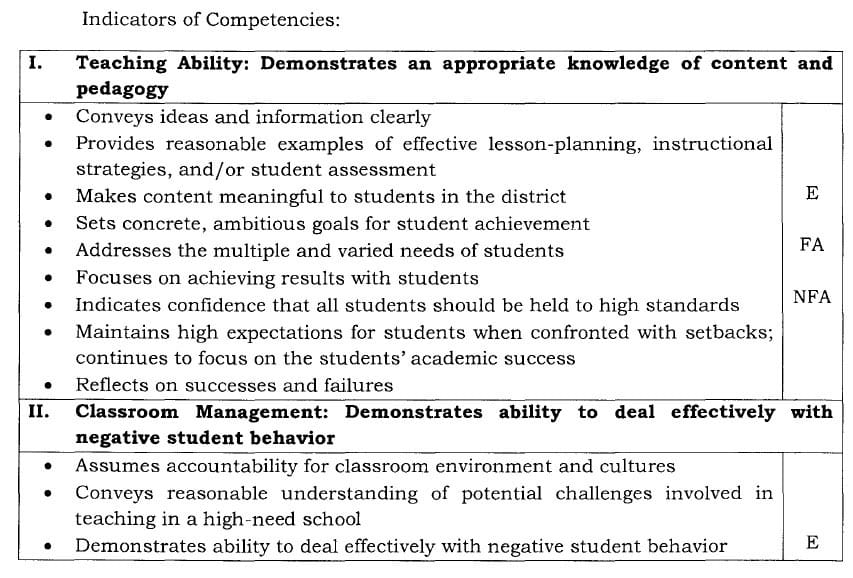
The aggregate of the points attained for each of the four (4) listed competencies (Teaching Ability, Classroom Management, School Fit, Skill in Contextualization) shall be the score for the interview.
7.6 Demonstration Teaching – 20 points
Applicants shall be evaluated according to the rubrics indicated on the following pages.
The Demonstration Teaching is designed specifically for the teaching positions they are applying for. Applicants are expected to demonstrate knowledge and skill in integrating indigenous knowledge, culture, and skills into the teaching learning process appropriate to the age, maturity, and grade of the IP learners to be handled.
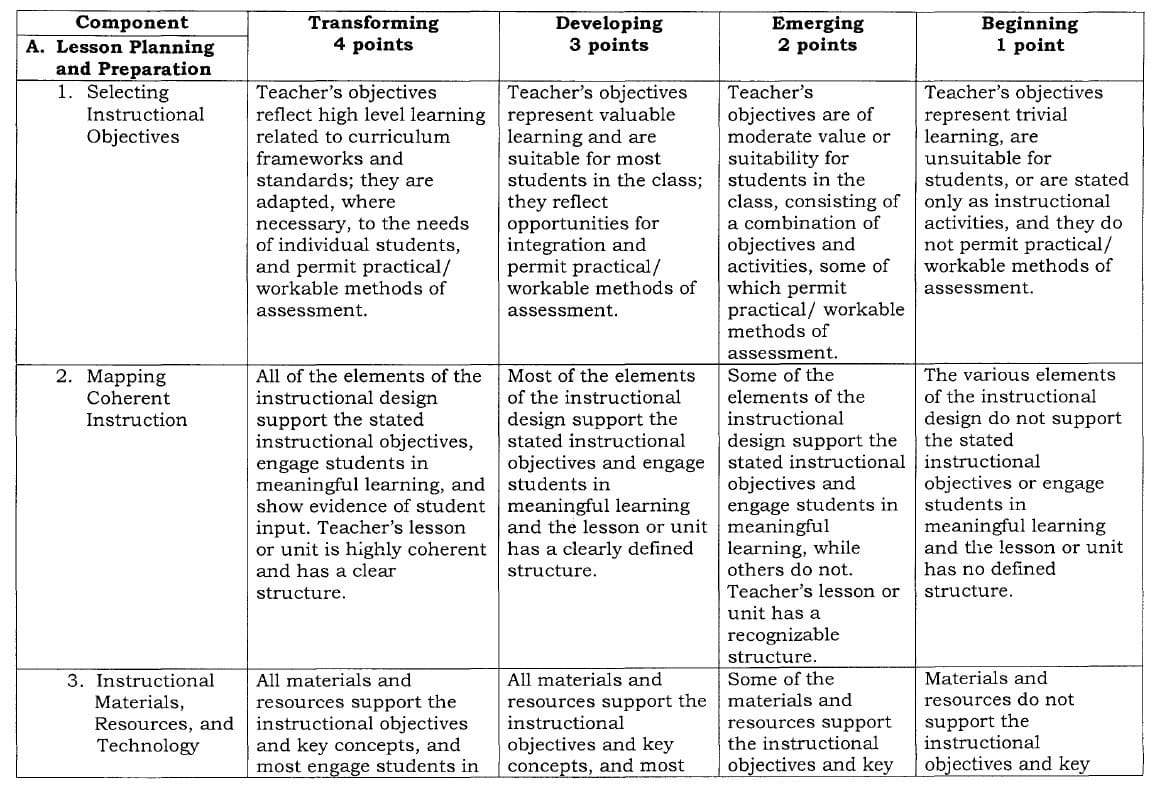
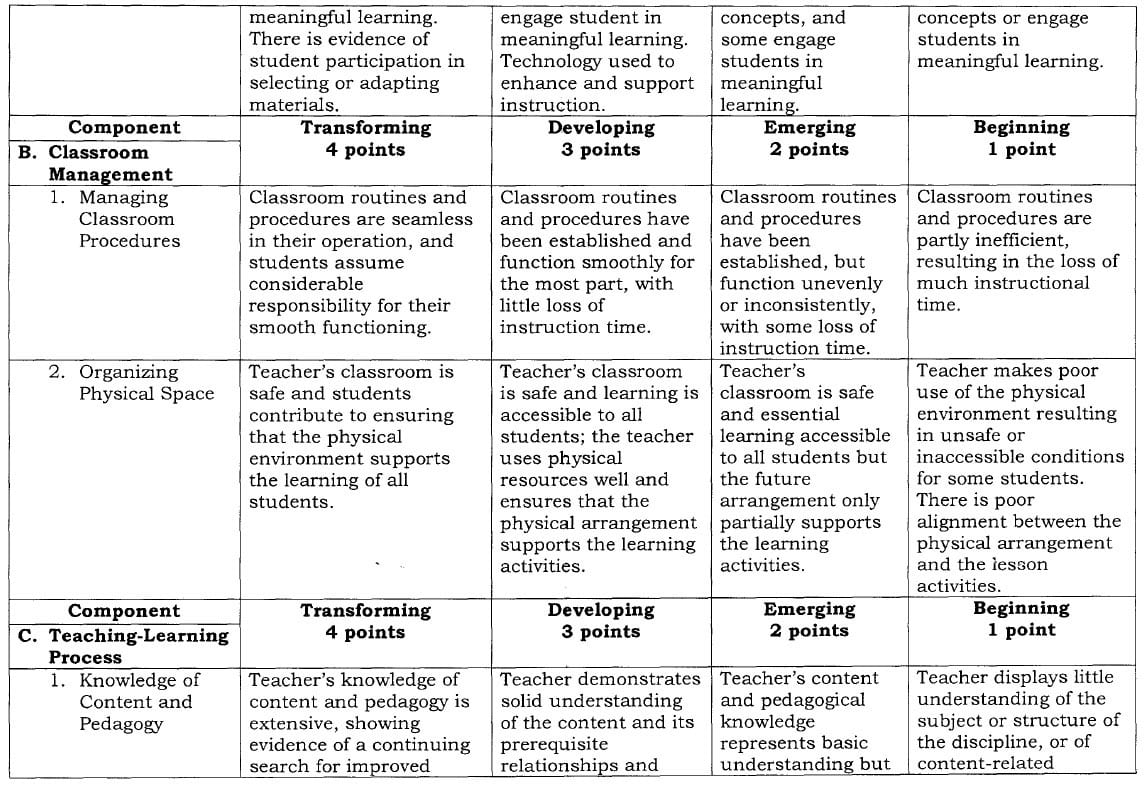
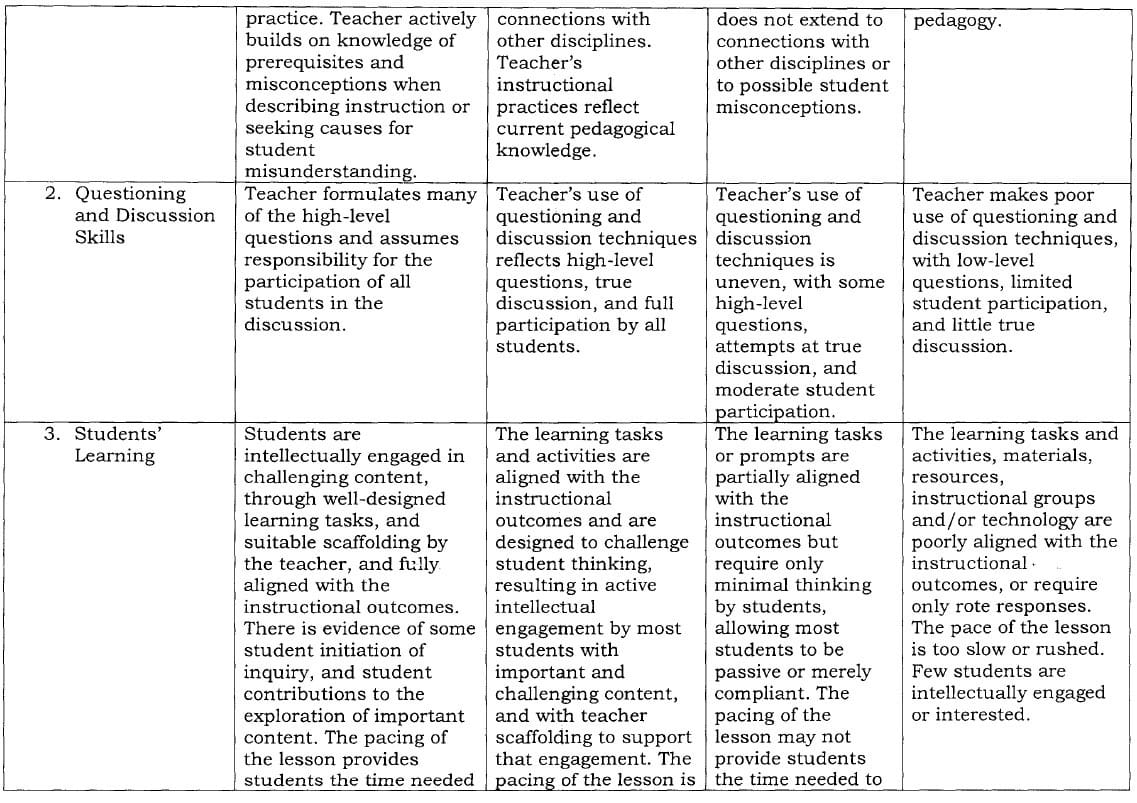
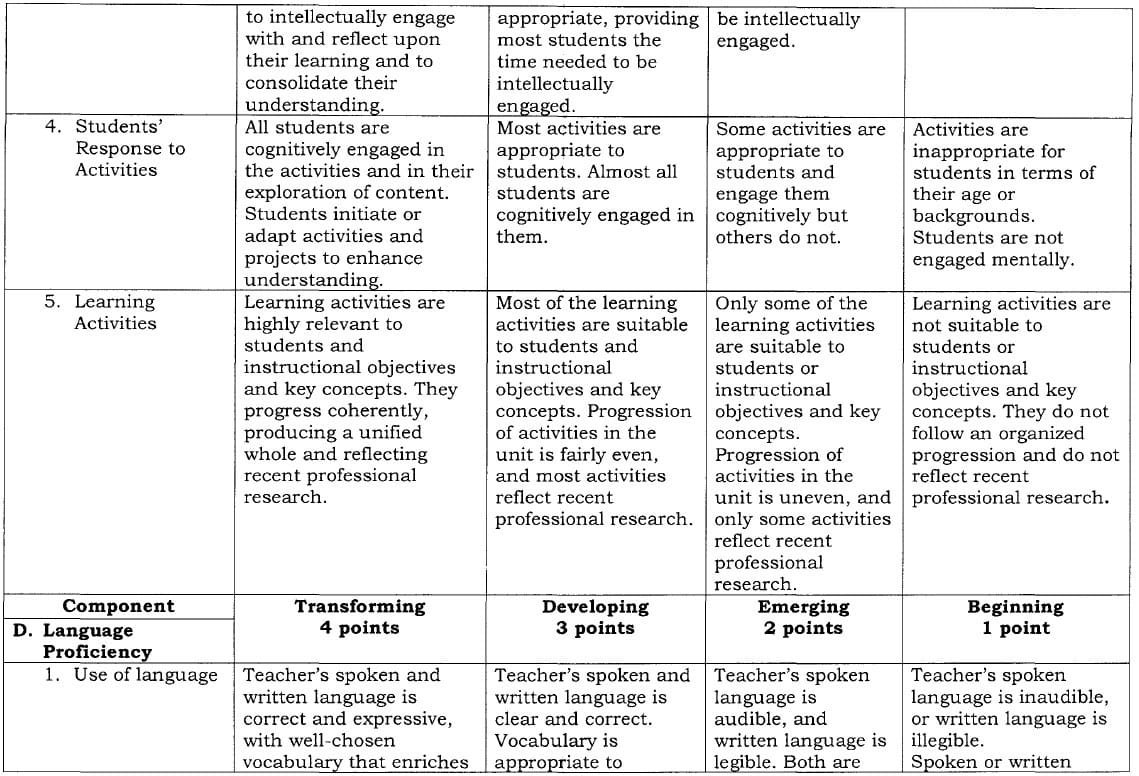
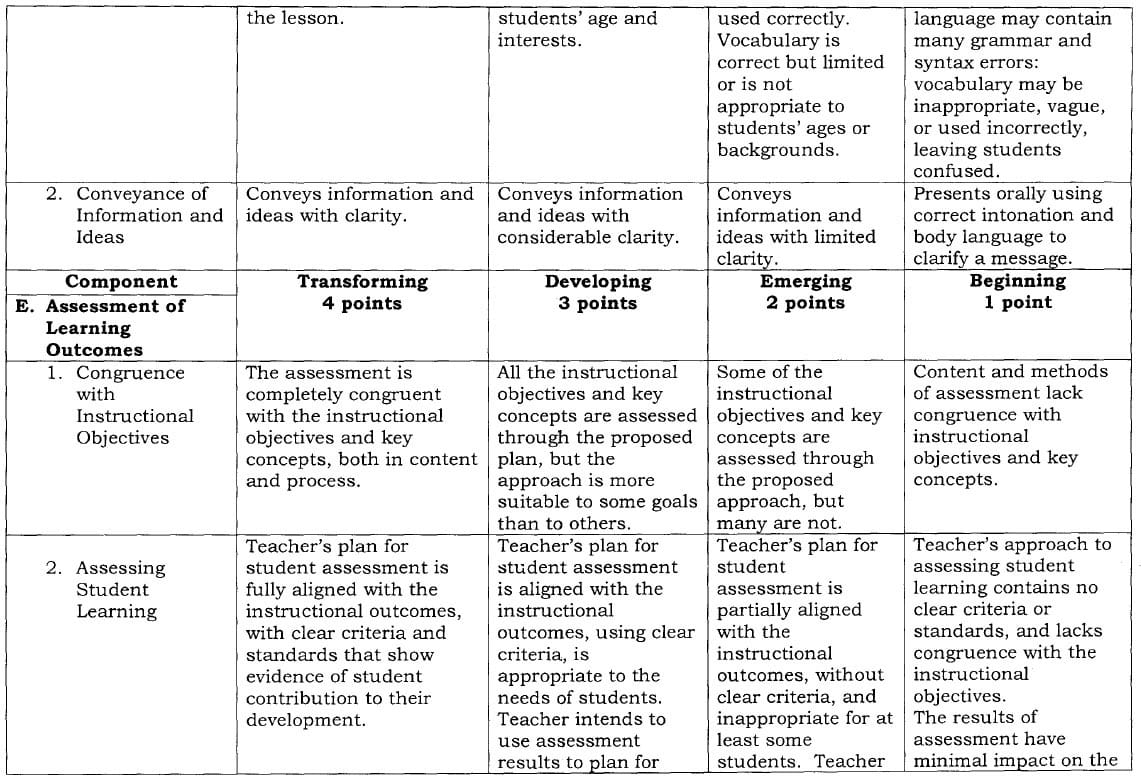
The number of points attained for each of the fifteen (15) listed components shall be added and then divided by sixty (60). The quotient shall then be multiplied by 0.20 or 20%. The product shall then be multiplied by 100.
Example:
Sum of points attained for the 15 components = 45
[(45 / 60 ) x 0.20] x 100 = 15
Score for Demonstration Teaching =15/20
Applicants for K to 3 who will perform Demonstration Teaching fluently using the mother tongue of the locality where the school being applied for is located shall be given an additional +5 points on top of the score they have obtained.
Applicants, including those for K to 3, who are able to demonstrate appropriate and relevant contextualization of the lesson shall be given additional +5 points on top of the score they have obtained.
7.7 English Communication Skills – 5 points
An English Proficiency Test (EPT) shall be administered to applicants by the Bureau of Education Assessment (BEA). The respective Division Testing Coordinators shall coordinate with BEA regarding the conduct and schedule of the exam in their division.
The total percentage score obtained by an applicant shall be multiplied by the weight of five (5) points, as follows:
Percentage Score = 98% or 0.98
Weighted Points = 5
Rating = 0.98 x 5 = 4.9 points
8.0 CONSTITUTING AND UTILIZING THE REGISTRY OF QUALIFIED APPLICANTS (RQA)
8.1 The RQA is the list of qualified applicants for appointment, which shall include their names, permanent addresses, and final evaluation ratings.
8.2 The RQA shall be prepared with the active participation of the recognized IP customary elders/leaders of the communities where the schools are located.
8.3 It shall be used in filling-up teacher vacancies identified in schools implementing IPEd, as identified by the SDO.
8.4 The cut-off score for inclusion in the RQA is seventy (70) points.
8.5 The RQA should 1) publish applicants’ names in alphabetical order, 2) show both the results of each criterion and the final overall rating, 3) only include those who obtained total scores of seventy (70) and above, 4) indicate the date of posting, and 5) be signed by the SDS.
8.6 Separate RQAs for Kindergarten, Elementary, and Secondary shall be prepared by the Division Selection Committees. The RQA for Kindergarten shall be prepared by the Division Selection Committee for Elementary Schools.
8.7 For applicants for K to 3, oral and written fluency in the learner’s mother tongue and the competency to contextualize lessons in the socio-cultural context of the learners shall be the primary considerations. Applicants should be speakers of the learner’s mother tongue and are knowledgeable enough about the socio-cultural context of the learners in the school of appointment.
8.8 For applicants for Grades 4 to 6, the competency to contextualize lessons in the socio-cultural context of the learners shall be the primary consideration. Applicants should be knowledgeable enough about the socio-cultural context of the learners in the school of appointment.
8.9 Competency in curriculum contextualization for IPEd and subject area specialization shall be the primary considerations for qualified applicants in the secondary school level. Thus, the applicant to be appointed should have the subject-area specialization needed by the school and demonstrates the capacity to contextualize the subject area in relation to the IP learners in that school.
8.10 The RQAs for Secondary Schools shall be prepared by subject area specialization, as follows: English, Filipino, Algebra, Trigonometry, Geometry, Statistics, General Science, Biology, Chemistry, Physics, Araling Panlipunan, Edukasyon sa Pagpapakatao, Music & Arts, Physical Education & Health, and SPED. Depending on the schools’ TLE offerings, separate RQAs for Agri-Fishery Arts, Home Economics, Information and Communications Technology (ICT), and Industrial Arts shall be prepared as well.
8.11 In schools with SPED teacher requirements, SPED specialization of qualified applicants and familiarity with the socio-cultural context of the learners shall be the primary considerations. As such, the applicant to be appointed should have the academic qualifications stated in Section 7.1.3.
8.12 As a general rule, only applicants listed in the RQA are eligible for hiring and appointment, with priority given to applicants who by ethnicity are members of IP communities and are bona fide residents of the barangay, municipality, city, or province (in the order as aforestated) where the school is located.
8.12.1 In cases where the number of qualified applicants from the barangay is greater than the number of available Teacher I items, priority in hiring shall be given to applicants from the barangay according to their overall rating (number score) in the RQA, from highest to lowest. The same rule shall apply in the appointment of applicants from the municipality, city, and province.
8.13 To respond to cases that may need specific considerations, the SDO, in consultation with the IP community’s customary elders/leaders and in line with the mandate to be responsive to the context of the learners, may also appoint applicants based on the following considerations:
a. the applicant is from a neighboring SDO (within or outside the region where the school is located) and has applied in schools that are within the same ancestral domain and are serving the same ICC as that of the school with vacancy;
b. the applicant from the same SDO or a neighboring SDO belongs to a different IP community from that of the learners but whose language is considered understandable/intelligible by the school community;
c. the applicant from the same SDO or a neighboring SDO has previously worked with the IP community where the school is located and is fluent enough with the language of the community.
8.14 In cases where all those in the RQA have been appointed and there are still available positions, applicants with eligibility (professional teaching license) who obtained ratings of 65.00 to 69.99 points may be given permanent appointments.
8.15 If all those with eligibility who obtained ratings of 65.00 to 69.99 points have been appointed and assigned to their respective stations and there are still available positions, applicants who obtained 65.00 points and above but are without eligibility may be given contractual appointments.
8.16 In cases where all those who obtained 65.00 to 69.99 (Items 8.14 and 8.15) have been appointed and assigned to their respective stations and there are still available positions, the concerned SDO shall coordinate with a neighboring SDO whose RQA has not yet been exhausted and facilitate their applicants’ deployment to the Division, subject to the applicants’ written concurrence. If an applicant refuses to be deployed to the other division, no deployment shall be effected. The evaluation process shall not be repeated; the scores given by the neighboring SDO shall be honored.
8.17 Following DepEd Memorandum No. 141, s. 2013 on the Hiring of Graduates of 1000 Teachers Program of the Philippine Business for Education, qualified applicants under PBEd’s 1000 TP program shall be given priority in hiring.
8.18 For SY 2016-2017, the RQAs must be posted by the second week of July 2016 or earlier. Qualified applicants may be appointed as soon as possible after the posting of the RQA. For succeeding school years thereafter, the RQAs should be ready by the last week of April of every year so that qualified applicants may be appointed by May 1. The RQA shall be valid for a period of one (1) school year.
9.0 APPOINTMENT OF APPLICANTS
9.1 The Schools Division Superintendent (SDS) shall:
a. Post the signed, complete results (RQAs) in at least three (3) conspicuous places in the Division Office and on the website of the Division Office. The RQAs must have the contents indicated in Section 8.5.
b. Provide the School District and every kindergarten, elementary, and secondary school with copies of the RQAs for posting in their areas of jurisdiction. Regional Directors, LGUs, and Legislative District Representatives shall also be provided with copies of the RQAs.
c. Advise newly hired teachers to report for their first day of work as soon as appointment papers are in order.
9.3 Contractual appointments shall not exceed one (1) year.
a. Renewal for the following year shall be subject to performance evaluation using the Results-Based Performance Management System (RPMS). The performance rating for the last rating period should be at least Very Satisfactory.
b. Those who wish to have a permanent status the following year should reapply and undergo the evaluation process provided in this Order again.
10.0 MONITORING OF DIVISION COMPLIANCE
Regional Directors shall regularly monitor and ensure strict compliance with the provisions of these hiring guidelines, as follows:
10.1 Dissemination and discussion of these guidelines with teachers, school heads, district supervisors, superintendents, and other schools division officials;
10.2 Preparation of schools to receive and acknowledge applications;
10.3 Organization of Division Selection Committees and School Screening Committees;
10.4 Briefing and orientation of members of these committees regarding their roles and functions;
10.5 Preparation of scoring sheets, interview guides, and tests of applicants;
10.6 Briefing and information-sharing with local governments and other local stakeholders in teacher hiring;
10.7 Preparation of a report on the observations, both positive and negative, in actual division practices in implementing these guidelines; and
10.8 Submission of said report on a quarterly basis to the Office of the Secretary through the Office of the Assistant Secretary for Governance and Operations.
11.0 PROTEST PROCEDURES
Pursuant to Item 2 of CSC MC No. 4, s. 2010 dated February 8, 2010, a protest on appointment shall no longer be acted upon through the grievance machinery. The same shall be initially appealed to the appointing authority, who issued the appointment, then to the Civil Service Commission Regional Office, and then to the Civil Service Commission Proper.
12.0 EFFECTIVITY
The guidelines and criteria provided in this Order shall take effect immediately.
BR. ARMIN A. LUISTRO FSC
Secretary
[scribd id=317154684 key=key-Wl3hlCxoE9PEN6uaPy6B mode=scroll]

